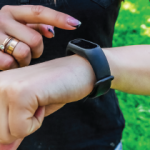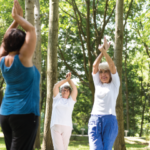“The bottleneck may be getting this message out. People with RA sometimes do have limitations in their ability to walk. If your feet are involved, walking may not be a good option. But there are options, [such as] swimming or water aerobics programs,” Dr. Katz says. “I think there are some access issues in terms of people who have physical limitations, who don’t have access to a facility to do an alternative activity or who live in an area where they may not feel safe walking in their neighborhood. But, we also did not say you had to do all of these steps at one time. You can spread them out over the day. You don’t need any training. You don’t need supervision. You don’t have to be anywhere special to do it. Sometimes getting up to do your exercise is hard. Getting out the door is probably the biggest barrier.”
Today’s pedometers are not your grandfathers’ pedometers. They are available in a variety of shapes (clip-on, wristband, necklace, etc.), sizes and price points. They come in bright colors and with cool names, such as the Fitbit Flex, Garmin vivofit or Jawbone UPmove. The pedometers in smartphones connect to any number of user-friendly, health-tracking apps.
“I was surprised that providing pedometers alone, without guidance, was successful in increasing activity and decreasing fatigue,” Dr. Margaretten says.
Dr. Katz says she would like to expand the research to patients with systemic lupus erythematosus (SLE) and SLE patients who are depressed. She thinks, for now, pedometers and physical-activity targets should be considered a new tool for the RA patients’ treatment toolbox. Dr. Margaretten agrees and notes that rheumatologists and their RA patients currently have few inexpensive, non-drug interventions for fatigue.
“We know that physical activity is good for patients with RA and that providing pedometers is an effective strategy for reducing fatigue, depression and self-reported disease activity,” she says. “I think the next step is to implement this change (i.e., provide pedometers to patients) in real-world clinical settings and evaluate whether patients can maintain adherence outside the perfect conditions of an randomized controlled trial.”
Richard Quinn is a freelance writer in New Jersey.
Reference
- Katz P, Margaretten M, Gregorich S, et al. Physical activity to reduce fatigue in rheumatoid arthritis: a randomized, controlled trial. Arthritis Care Res (Hoboken). 2017 Apr 5. doi: 10.1002/acr.23230. [Epub ahead of print]

